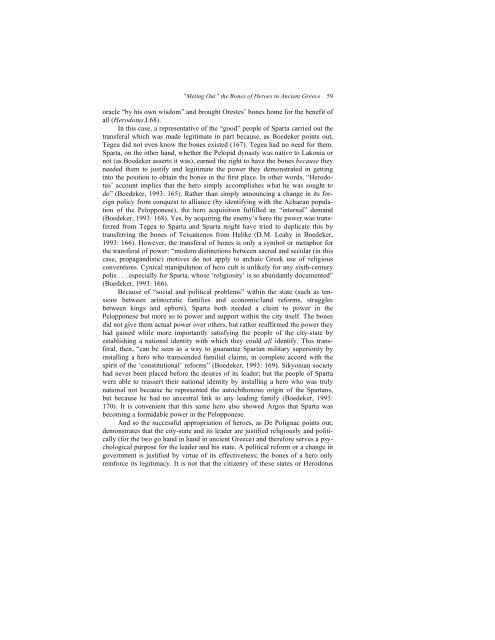You also want an ePaper? Increase the reach of your titles
YUMPU automatically turns print PDFs into web optimized ePapers that Google loves.
“Meting Out” the Bones of Heroes in Ancient Greece 59<br />
oracle “by his own wisdom” and brought Orestes’ bones home for the benefit of<br />
all (Herodotus.I.68).<br />
In this case, a representative of the “good” people of Sparta carried out the<br />
transferal which was made legitimate in part because, as Boedeker points out,<br />
Tegea did not even know the bones existed (167). Tegea had no need for them.<br />
Sparta, on the other hand, whether the Pelopid dynasty was native to Lakonia or<br />
not (as Boedeker asserts it was), earned the right to have the bones because they<br />
needed them to justify and legitimate the power they demonstrated in getting<br />
into the position to obtain the bones in the first place. In other words, “Herodotus’<br />
account implies that the hero simply accomplishes what he was sought to<br />
do” (Boedeker, <strong>19</strong>93: 165). Rather than simply announcing a change in its foreign<br />
policy from conquest to alliance (by identifying with the Achaean population<br />
of the Pelopponese), the hero acquisition fulfilled an “internal” demand<br />
(Boedeker, <strong>19</strong>93: 168). Yes, by acquiring the enemy’s hero the power was transferred<br />
from Tegea to Sparta and Sparta might have tried to duplicate this by<br />
transferring the bones of Teisamenos from Helike (D.M. Leahy in Boedeker,<br />
<strong>19</strong>93: 166). However, the transferal of bones is only a symbol or metaphor for<br />
the transferal of power: “modern distinctions between sacred and secular (in this<br />
case, propagandistic) motives do not apply to archaic Greek use of religious<br />
conventions. Cynical manipulation of hero cult is unlikely for any sixth-century<br />
polis . . . especially for Sparta, whose ‘religiosity’ is so abundantly documented”<br />
(Boedeker, <strong>19</strong>93: 166).<br />
Because of “social and political problems” within the state (such as tensions<br />
between aristocratic families and economic/land reforms, struggles<br />
between kings and ephors), Sparta both needed a claim to power in the<br />
Pelopponese but more so to power and support within the city itself. The bones<br />
did not give them actual power over others, but rather reaffirmed the power they<br />
had gained while more importantly satisfying the people of the city-state by<br />
establishing a national identity with which they could all identify. This transferal,<br />
then, “can be seen as a way to guarantee Spartan military superiority by<br />
installing a hero who transcended familial claims, in complete accord with the<br />
spirit of the ‘constitutional’ reforms” (Boedeker, <strong>19</strong>93: 169). Sikyonian society<br />
had never been placed before the desires of its leader; but the people of Sparta<br />
were able to reassert their national identity by installing a hero who was truly<br />
national not because he represented the autochthonous origin of the Spartans,<br />
but because he had no ancestral link to any leading family (Boedeker, <strong>19</strong>93:<br />
170). It is convenient that this same hero also showed Argos that Sparta was<br />
becoming a formidable power in the Pelopponese.<br />
And so the successful appropriation of heroes, as De Polignac points out,<br />
demonstrates that the city-state and its leader are justified religiously and politically<br />
(for the two go hand in hand in ancient Greece) and therefore serves a psychological<br />
purpose for the leader and his state. A political reform or a change in<br />
government is justified by virtue of its effectiveness; the bones of a hero only<br />
reinforce its legitimacy. It is not that the citizenry of these states or Herodotus

















